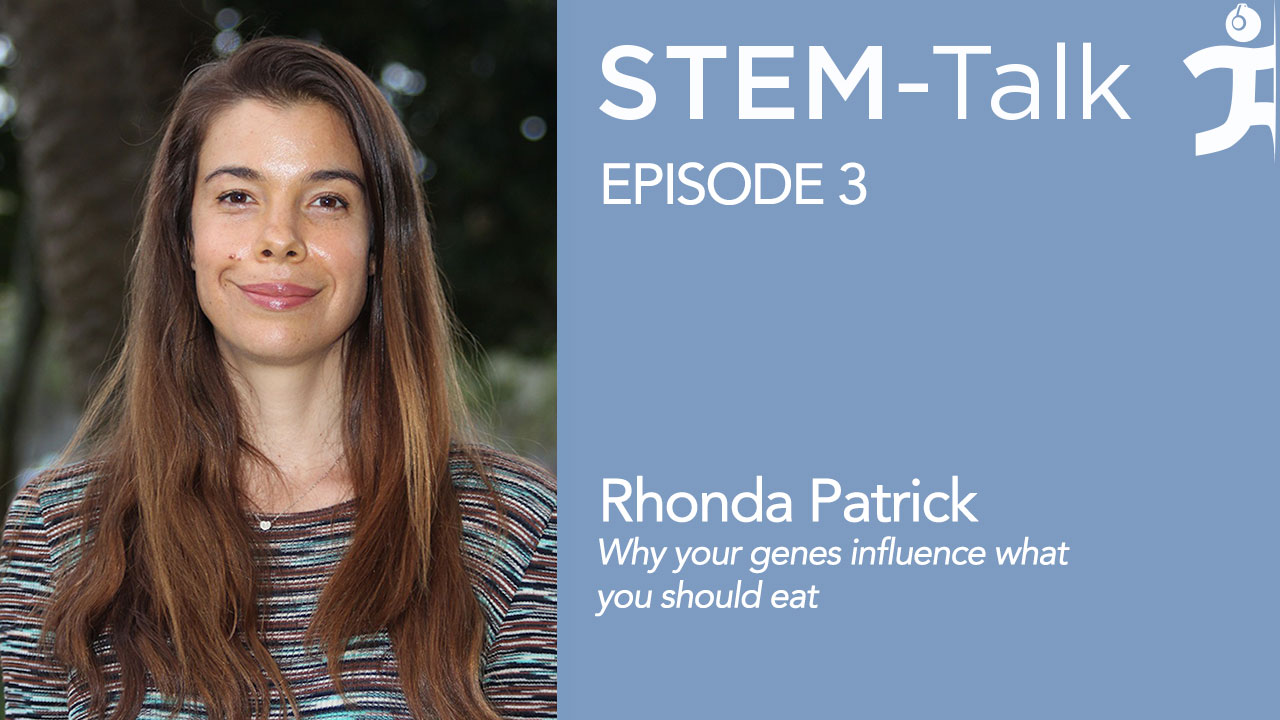STEM-Talk
Episode 3: Rhonda Patrick discusses why your genes influence what you should eat
// Mar 15, 2016

Before Rhonda Perciavalle Patrick “stumbled into research”—at the renowned Salk Institute—the Southern California native was a biochemistry major and a passionate surfer.
She’s still an avid surfer, but of her college major, Patrick said, “I wasn’t feeling connected to synthesizing peptides in the lab, so I decided that I wanted to try out biology.”
After earning her undergraduate degree in biochemistry from the University of California at San Diego, Patrick worked at the Salk Institute’s aging laboratory, where she became fascinated with watching how much the lifespan of nematode worms could fluctuate depending on the experiments done on them.
Hooked on aging research, she pursued that thread all the way to the laboratory of renowned scientist Dr. Bruce Ames, who developed the Triage Theory of Aging, which focuses on the long-term damage of micro-nutrient deficiencies.
Patrick is currently working with Ames as a post-doc at the Children’s Hospital Oakland Research Hospital. Together, they are looking at strategies to reverse the aging process.
She also received her Ph.D. in biomedical sciences from the University of Tennessee, where she worked at St. Jude Children’s Research Hospital.
Patrick lectured at IHMC in Ocala in December. https://youtu.be/wQZz5PklDB0. She also has her own podcast show, called “Found My Fitness,” at: http://www.foundmyfitness.com
STEM-Talk host Dawn Kernagis and co-host Ken Ford talked with Patrick about her research and development as a young scientist who is now at the forefront of the longevity field.
:35: Dawn introduces Rhonda Patrick as “an American biochemist, cell biologist, science communicator and podcaster.” Patrick is currently studying the effects of micro-nutrient inadequacies on metabolism, inflammation, DNA damage and aging.
4:23: Patrick discusses her appreciation for her graduate school mentor. “I got a lot of micro-management,” she said, adding that she acquired the tools she would need to answer interesting biological questions regarding cancer metabolism, apoptosis, and nutrition.
6:00: Nutrigenomics, Patrick said, is a “complex interaction between the nutrients, micro-nutrients, macro-nutrients (fat) and certain genes that we have.”
6:43: As humans, Patrick said, “We all have the same genes, but alternative forms of these genes for unknown reasons. A single nucleotide change in the DNA sequence of a gene can alter the gene function.”
7:13: Certain polymorphisms, or genetic variants, probably emerged because of environmentally-induced genetic stressors, Patrick said. For example, soil high in selenium may have caused people to develop a polymorphism that inhibits the absorption of selenium because they get so much of it naturally.
8:11: Even if the polymorphism changes the gene in a negative way, you can often find a benefit, Patrick said. “That’s probably why it’s survived.”
8:42: Commercial break: STEM-Talk is an educational service of the Florida Institute for Human and Machine Cognition, a not-for-profit research lab pioneering ground-breaking technologies aimed at leveraging human cognition, perception, locomotion and resilience.
9:25: Hundreds of genes interact with micro-nutrients and macro-nutrients that we take in. For example, half the population has a polymorphism that changes the way your body metabolizes folate and folic acid, the oxidized form of folate.
11:05: Folate helps us make methyl groups, which are used for various biological functions. The MTHFR gene helps with that process, so people with a genetic polymorphism need to take a methyl folate 5 supplement.
12:00: The TRPM6 gene is a transporter of magnesium, an essential micronutrient required in over 300 enzymes in body. Some of its functions include making/using ATP; repairing DNA damage; establishing new neuronal connections in the brain.
12:27: People with a genetic polymorphism cannot transport magnesium in/out of cells, and have a significantly higher risk of diabetes than the average population.
12:52: Forty-five percent of the U.S. population does not meet the Recommended Daily Allowance for magnesium, which is 350-400 milligrams a day, Patrick said. “That, coupled with a high refined carbohydrate diet is like a ticking time bomb for Type 2 diabetes.”
13:19: Patrick notes another polymorphism for the PPAR gamma-macronutrient, which is very important for how the body metabolizes certain types of fat; and how the body can deactivate carcinogenic xenobiotics, foreign chemical substances within organisms.
13:34: “Our bodies are beautifully designed to handle all types of stress; but our genes have to be working; they have to have the right nutrients.”
14:08: Gene polymorphisms regulate our phenotype—including features such as eye and hair color. But they also regulate our risk of diseases; and the type/amount of certain foods we should take in or avoid.
15:05: Clinical trials in nutrition are often not done adequately, Patrick said. This is because of cost, and the heterogeneity of the population.
16:41: Heterocyclic amines, chemicals formed when you cook meat at a really high temperature, are shown to be carcinogenic in mice studies and linked to an increased cancer risk in humans in epidemiological studies. Some people have a gene polymorphism that does not allow them to inactivate the HCAs quickly, and the build-up can form a carcinogen.
18:51: More nutritional studies are needed because “There’s a very complex interaction between genes and diet.”
19:18: More and more physicians are becoming aware of nutrigenomics as patients bring it to their attention, armed with data from gene tests such as 23andMe.
20:33: Commercial break: STEM-Talk is an educational service of the Florida Institute for Human and Machine Cognition, a not-for-profit research lab pioneering ground-breaking technologies aimed at leveraging human cognition, perception, locomotion and resilience.
21:00: Patrick has had her own DNA polymorphisms sequenced by 23andMe. She takes supplements and avoids certain foods based on this knowledge.
22:50: Diet/lifestyle/stress can alter gene expression, which can carry over to the sperm/egg DNA and be passed onto offspring.
24:17: An Australian study published in Nature showed that obese, insulin-resistant mice on high inflammatory diets had female offspring, who despite being fed normal diets and having lean bodies, developed Type I diabetes.
25:40: The Journal of Cell Metabolism published a paper comparing methyl groups of obese males versus lean ones. When the obese males lost weight, there were changes in their epigenetic markers that control hunger hormones.
27:20: While bad diets affect your disease risk and that of your offspring, “You can make a change,” Patrick said. “If you’re obese, overweight, eating a terrible diet, it’s not too late.”
28:30: Unique gene signatures occur at various ages. Researchers can look at a blood cell and tell a person’s age within a few years.
29:30: Environmental factors affect the epigenetic markers that affect the genes controlling metabolism, DNA repair, new stem cell production. Certain diet/lifestyle factors can positively affect those genes.
30:44: Lifestyle factors such as exercise, sleep, a good diet high in micro-nutrients/low in refined carbs, and low stress likely affect changes at the epigenetic level. “More and more scientists are beginning to study this and will be able to tease it apart.”
32:16: When you heat shock an organism you activate genes involved in stress resistance.
33:17: Some of the benefits of exercise come from heat shocking the body. One Finnish study showed that men who regularly used the sauna had lower all-cause mortality. Other studies have shown that mice, flies, and worms can increase their lifespan by 15-20 percent.
34:39: Heat stress increases the brain-derived neurotropic factor, which is important for growing new neurons; maintaining neurons; and strengthening the synapses between neurons.
35:20: Exercise and sauna together have a synergistic effect. May positively affect your brain.
35:33: Ford notes that wrestlers, boxers and other athletes sometimes use sauna to elevate their heart rate. Sauna use also seemed to help with recovery.
36:51: Commercial break: STEM-Talk is an educational service of the Florida Institute for Human and Machine Cognition, a not-for-profit research lab pioneering ground-breaking technologies aimed at leveraging human cognition, perception, locomotion and resilience.
38:40: Vitamin D is important for making serotonin in the brain, and for early brain development. It helps shape the structure of the brain, guides neurons to the right place and ensures that the right type of neurons develop.
39:33: The developing fetus depends on maternal levels of Vitamin D. Deficient levels might alter brain development and lead to conditions like autism.
40:19: Serotonin plays a well-known role in mood alteration; it also affects impulse control, long-term thinking, planning and memory.
42:15: Many people have polymorphisms in serotonin-related genes, including Patrick herself. These polymorphisms, coupled with deficient Vitamin D intake, can be a “double whammy” for people.
43:11: “It is possible that this complex interaction between serotonin and Vitamin D may make a huge difference in peoples’ lives that are Vitamin D deficient.”






